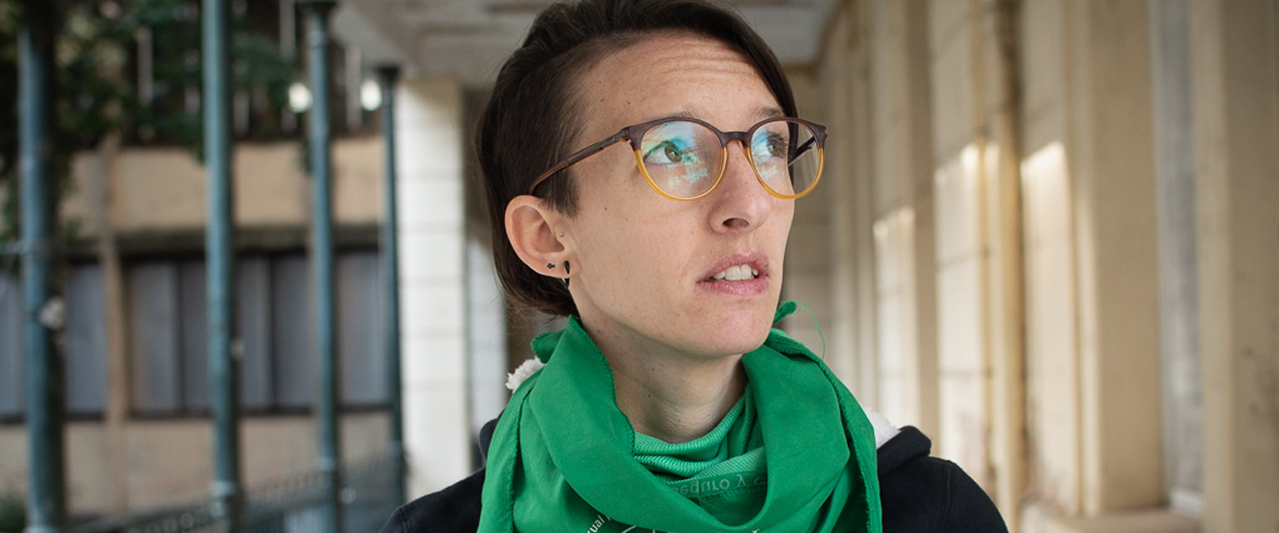A Q & A with Argentinian provider and advocate Dr. María Paula Botta
Read the Q & A in Spanish here.
María Paula Botta is a physician and abortion provider in Rosario, Argentina. A passionate advocate for sexual and reproductive health and rights, Botta is member of the Network of Health Professionals for the Right to Choose. She has participated in Ipas trainings on comprehensive abortion care (CAC) and conducted research on CAC services in Rosario. Botta is active in the National Campaign for the Right to Safe and Free Legal Abortion (Aborto Legal Ya), which in 2018 pushed for the legalization of abortion on request in Argentina.
In honor of the National Day of Appreciation for Abortion Providers, which was this week, Ipas talked to Botta about her advocacy work and what encourages her to speak out for sexual and reproductive rights in Argentina.
What motivates you to provide care to women undergoing abortion in Argentina?
I received many women at the hospital who were admitted for ongoing or incomplete abortions, sometimes with infections, that resulted in their death. Abortion is a serious public health and social justice problem, and to this day it is the primary cause of death among pregnant individuals—especially people with fewer financial and other resources.
Abortion is, above all, an issue of rights—a woman’s right to make decisions about her body. A woman who wants to end her pregnancy will do so. What is at stake is whether she will put her life and well-being at risk, or whether health facilities will begin to provide quality services that uphold the rights to health and freedom of choice.
What encourages you to advocate and speak out for sexual and reproductive rights in Argentina?
I am part of a collective of professionals—the Network of Health Professionals for Free Choice—which includes more than 1,000 health workers who work to ensure legal abortion within Argentina’s current legal framework. We have built a network of accompaniment (through which women seeking medical abortion are paired with women who accompany them throughout the process of a safe abortion) for legal abortion in Argentina. We have succeeded at not feeling “alone” in this practice.
We spoke out in 2018 at the National Congress of Argentina to request the legalization of abortion on request. Our presentations, based on our daily practice, show that the legal and symbolic stigmatization of abortion generates more deaths and makes pregnant people more vulnerable. We need public policies that ensure the highest attainable standard of health for the entire population.
What are your thoughts on the state of sexual and reproductive health and rights in Argentina?
Since 2002, Argentina has had a Program of Sexual Health and Responsible Childbearing. This program has tried to increase access to sex education and contraceptive methods, and to reduce deaths due to abortion. But there is still much to be done. Only nine provinces (out of 23) adhered to the protocol for providing care to people who have the right to legal abortion, leaving women exposed based on where they live.
The province of Santa Fe, where I work, was a pioneer in implementing policies on sexual and reproductive health and non-reproductive health, increasing access to modern contraceptive methods for the entire population. It was also the country’s first province to begin public production of misoprostol and to incorporate the manual vacuum aspiration (MVA) technique in many of its health facilities. These policies yield results, like in Rosario, which has had no deaths of pregnant people for the past six years.
Could you share a little bit about Las Socorristas? (Botta acts as a resource to the network.)
Las Socorristas (“first responders”) is a network of activists, collectives and feminist groups that began in 2009 and joined the broader women’s movement to advocate for new political agendas. It was active in the National Campaign for the Right to Legal, Safe, and Free Abortion in Argentina, which presented the voluntary termination of pregnancy bill before the National Congress in 2018.
The group uses a hotline to advise and accompany women who want to have an abortion. Las Socorristas help women decide how and where to have an abortion and how to use misoprostol safely. Accompaniments are based on women’s decisions, respecting how they wish to experience their abortions. Some do not want to go through the health system, due to fear, lack of knowledge, bad experiences, etc. In those cases, socorristas advise them on how to have a safe abortion with pills. Las Socorristas also work with general practitioners to reduce people’s barriers to accessing legal abortion.
As more public policies with a gender and rights perspective are implemented—and as access to legal abortion improves within the public health system—there will be less need for organizations like Las Socorristas to ensure safe abortions. Today, most women prefer to enter the health system and to experience abortion within the framework of a legal medical act—especially because it gives them access to free medication, which would otherwise be expensive. But there will always be a pool of women who choose an autonomous abortion, without medical intervention, and Las Socorristas play a very important role in this.
For more information, contact [email protected].



